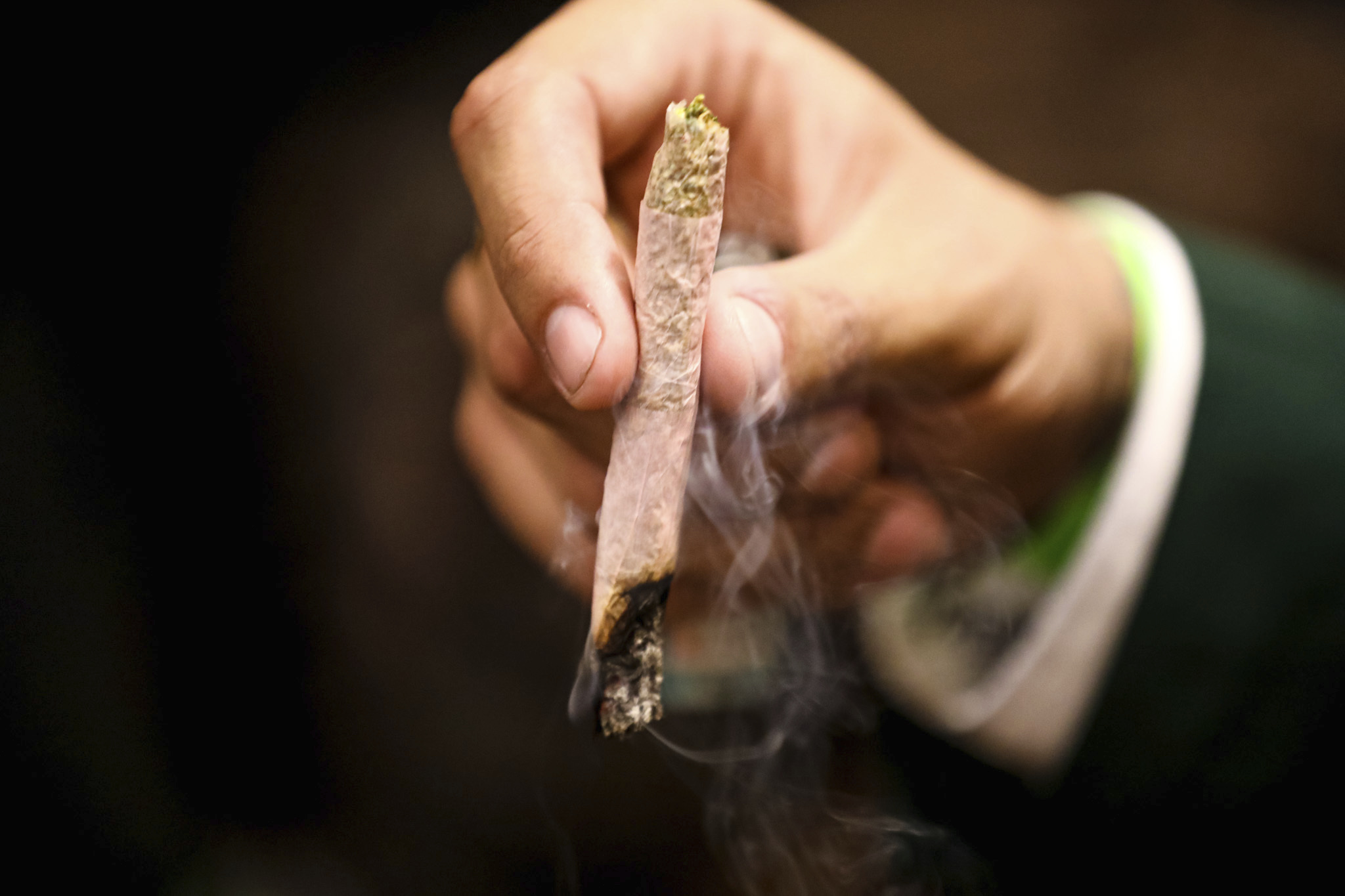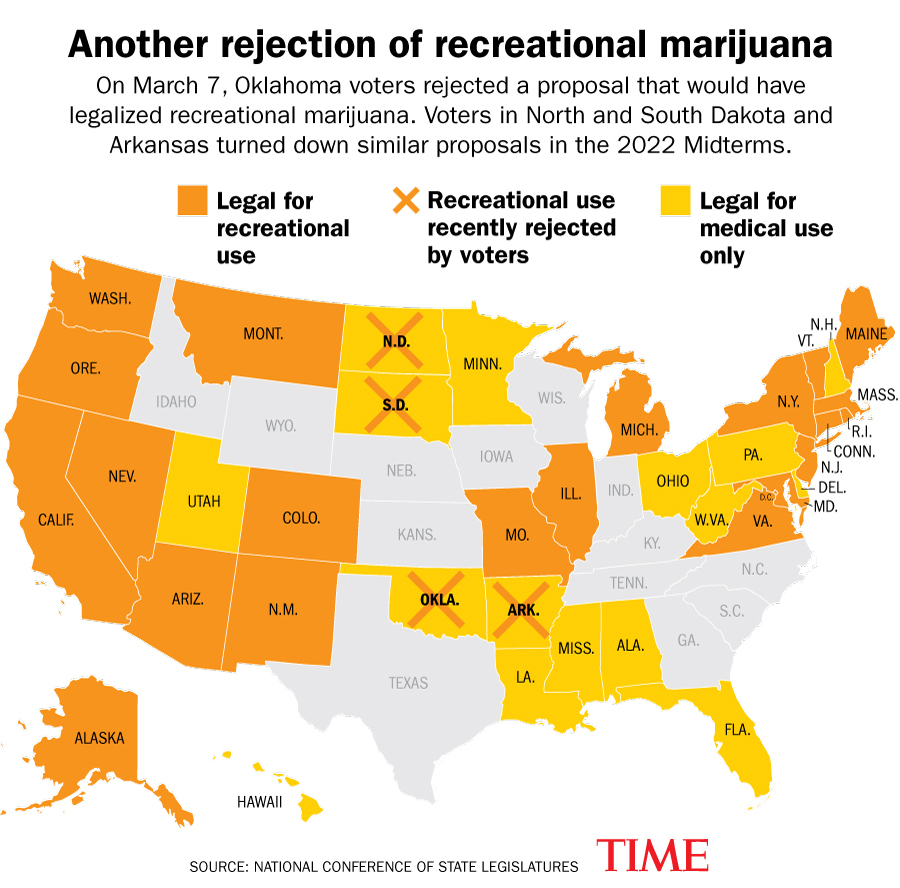
Oklahoma voters dealt a resounding loss to marijuana legalization on Tuesday: With over 95% of votes in, nearly 62% of voters came out against expanding legal cannabis to include recreational use, compared to 38% supporting it.
The decision in Oklahoma comes after ballot measures in three other states—North Dakota, South Dakota, and Arkansas—failed in the 2022 midterm elections. It’s a reminder that recreational marijuana still faces powerful headwinds—especially in conservative states.
Despite the setbacks, marijuana legalization advocates still believe that time and public opinion are on their side. In other states, including Arizona and Missouri, voters initially voted down recreational cannabis legalization before voting in favor of it years later. “We’ve been used to losing for many years, and it’s something that we don’t forget,” says Morgan Fox, political director at NORML, a nonprofit which advocates for marijuana legalization. “We’re gonna see support continue to grow, and we have seen and grow over the past decades.”
Meanwhile, opponents of cannabis legalization say that their victory in Oklahoma is a sign of the strength of their movement. Luke Niforatos, an executive vice president at Smart Approaches to Marijuana (SAM), which opposed the legalization measure, said that his fellow organizers see this as a signal to be more ambitious, such as by pushing to get the repeal of marijuana legalization on the ballot in other states—and pushing for reforms, such as limits on marijuana potency, with an aim of having the marijuana industry “treated like tobacco.”
More from TIME
“I think we’re reaching a fever pitch in terms of the harms of these new marijuana products and the overreach of the industry,” says Niforatos. “I think what we’re seeing is a backlash to industry overreach, a backlash to an industry that is targeting kids with child friendly products, an industry that is advertising everywhere, just like Big Tobacco did. I think people in Oklahoma were really sick of that.”

Marijuana legalization had major factors working against it not only in Oklahoma, but also in the states that rejected legalization in 2022. One major obstacle is that these states are overwhelmingly conservative. While support for marijuana legalization has increased over time across demographics, Republicans and other conservatives are less likely to support marijuana legalization, especially recreational marijuana. An Oct. 2022 Pew Research Center poll found that 45% of Republicans supported the legalization of recreational marijuana, while 39% supported only medical legalization, compared to 59% of all U.S. adults polled who support the legalization of recreational marijuana, and 30% who supported medical legalization only.
What made the vote in Oklahoma more difficult, says Fox, is that it was conducted during a special election, when older and more conservative voters are more likely to turn out. And conservative leaders vocally opposed that measure. That included not only Governor Kevin Stitt—who said the decision to vote down legalization was “the best thing to keep our kids safe and for our state as a whole” on Tuesday— but also the Oklahoma Faith Leaders activist group and the Oklahoma Farm Bureau. The Farm Bureau described the ballot initiative as a threat to rural communities, blaming the marijuana industry for creating a “strain on our rural electric and our rural water utilities.” The Faith Leaders also claimed that the marijuana industry has led to “foreign nationals, including Chinese, Mexicans and Russians…purchasing Oklahoma farm land illegally, bringing in labor and sex trafficking.”
Niforatos said that by polling of voters in Oklahoma, his organization found that concerns about cartels growing marijuana was particularly compelling to voters. However, he said the top message was the risk of secondhand smoke for children, including an ad that claimed the bill “stinks to high heaven.”
In Oklahoma, the marijuana industry may have also been a victim of its own success. After medical marijuana was legalized in 2018, the state didn’t impose a cap on licenses, and acquiring a license and setting up a business is cheaper than in other states that have legalized cannabis. In Niforatos’ view, the Oklahoma program made it easy to buy marijuana for Oklahomans to buy for recreational purposes—even though that remains illegal in the state. As new businesses flooded the state, they outpaced the number of compliance officers, Fox said. The state later passed a two-year moratorium on new licenses for growers, dispensaries, and processing companies. “They made a lot of mistakes during implementation and through enforcement,” Fox said of Oklahoma. “And I think that that has certainly resonated with voters. But that’s something that advocates in Oklahoma can learn from.”
Niforatos says that his organization now feels ready to be “going more on the offensive” by working to regulate the industry in Oklahoma, and working to rescind legalization more broadly. “Most American states have not legalized marijuana,” he said. “The President of the United States is against the legalization of marijuana, and neither major party has the legalization of marijuana in either of its platforms. So we are very far away from anything being inevitable.”
More Must-Reads from TIME
- Cybersecurity Experts Are Sounding the Alarm on DOGE
- Meet the 2025 Women of the Year
- The Harsh Truth About Disability Inclusion
- Why Do More Young Adults Have Cancer?
- Colman Domingo Leads With Radical Love
- How to Get Better at Doing Things Alone
- Michelle Zauner Stares Down the Darkness
Contact us at letters@time.com